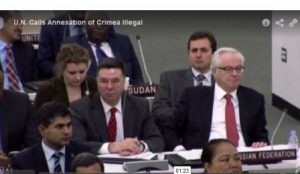The recent Russian annexation of Crimea is a hot-button international issue that pits the West against Russia and has brought back memories of the Cold War. While this goes on, little attention has been paid to the position of many African nations on the issue.
Many of the countries which make up the African Union (AU) have been silent, and have said little publicly.
As I have been scouring the internet, listening to the radio and watching TV, and searching for information on where the AU countries stand on the matter, I have found very little.
While the United Nations (UN) and its Secretary General Ban Ki-Moon, as well as the European Union (EU), have condemned the Russian actions, the AU position on the matter remains murky and confusing.
Ban Ki-Moon has already traveled to Moscow and met with Russian President Vladimir Putin. He has also visited Kyiv, the Ukrainian capital, and held talks with officials there.
Even while the Pan-African parliament, the legislative arm of the AU, is said to be in support of the Russian annexation, according to information from the ITA-TASS News Agency, the member nations of the AU voted not in unison, but rather differently on the matter.
A U.N. resolution proposed by Ukraine and backed by the U.S. and the European Union (EU) ‘garnered 100 votes in favor, 11 votes against, with 58 abstentions,’ according to The New York Times.
I have been looking at the vote tallies for the block of African nations which make up to AU to see how they voted. As I have tried to understand why many dodged the issue altogether by not taking a firm position and choosing instead to abstain, it is interesting to see which countries voted Yes, which ones voted No, and those that abstained.
And this leads to many other questions.
Why for example would Zimbabwe vote No, while Niger, Nigeria, and Cameroon voted Yes. Why would Uganda, Rwanda, Senegal, Mali, Kenya, Ethiopia, South Sudan, and South Africa abstain, while Chad, Benin, and the Central African Republic vote Yes on the matter? And why did others simply abstain rather than vote Yes or No?
Does this make a difference, one might ask.
While questions like this linger, the crisis bears its own ramifications for the continent.
Writing for the Kenya Daily Nation, Peter Kagwanja states:
“Pundits have ruled out a Cold War redux. But the Crimean conflict is a game-changer in the global order of things, with far-reaching implications for Africa. Analysts are focusing on the implications of the Crimean referendum on Africa’s ethnically divided states.
Richard Dowden, Director of the British Royal African Society, warns the referendum in Crimea is a dangerous precedent and a bad model for Africa.”
So I turned to Derrick Hudson(Ph.D.), professor of International Relations at the Colorado School of Mines, for some answers.
Why do you think African countries are silent on the matter?
Professor Derrick Hudson:
I think that many African leaders do not see an immediate link to the situation in Crimea and their national interest concerns.
To the extent African leaders do think about the situation in Crimea, I would suspect that many of these leaders do not want to be on the opposing side of Russia in the event Russia might retaliate in some manner later down the line.
Even though the Cold War has long ended, many African countries continue to feel the need to look to larger hegemonic states like Russia for potential support.
Another factor that could be at play is the issues of self-determination that is a major part of the Crimea/Ukranian crisis. As you well know, there are many ethnic groups in many African countries that might be inspired to agitate for autonomy and independence. Of course, such agitations would be volatile and chaotic.

